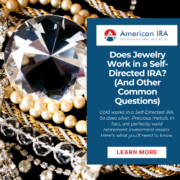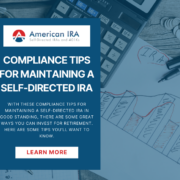Facts Every Self-Directed IRA Owner Should Know
If you own a Self-Directed IRA, congratulations on taking control of your retirement future and exploring the world of investment opportunities Self-Directed IRAs can offer! Now the fun part begins: investing. As you learn how to invest this way, remember that being a Self-Directed IRA owner comes with responsibilities and specific rules you need to be aware of. Let’s tackle some of those facts—as well as how you can navigate them as you learn to be a more diversified investor.
Fact #1: Hardship Distributions are Available in Certain Circumstances
While the primary purpose of an IRA is to save for retirement, life can potentially throw a few curveballs your way. It can be nice to know when a retirement account offers you some flexibility. And yes, Self-Directed IRAs can provide a lifeline during these tough times. Hardship distributions, available in certain circumstances, allow you to access your retirement funds to cover financial emergencies like medical expenses.
These distributions are subject to taxes and potential penalties. Consult with a tax advisor or financial professional before considering a hardship distribution to weigh the pros and cons very carefully. You’ll want to ensure you meet the necessary criteria to avoid additional fees that could make the hardship distributions more trouble than they’re worth.
Fact #2: You May Have to Take Required Minimum Distributions (RMDs)
When you reach a certain age, the IRS requires you to start taking distributions from your retirement accounts, including Self-Directed IRAs. These mandatory withdrawals are known as Required Minimum Distributions (RMDs). Failure to take RMDs as required can result in substantial penalties. It’s crucial to plan ahead and factor RMDs into your retirement income strategy.
Want to skip the RMDs? You can use a Self-Directed Roth IRA instead, which uses after-tax contributions to ensure you never have to take distributions from a retirement account until you’re good and ready.
Fact #3: Self-Directed IRAs Come with Wealth Protection Benefits
One of the key advantages of Self-Directed IRAs is their ability to provide wealth protection. While traditional IRAs often limit your investment options to stocks, bonds, and mutual funds, Self-Directed IRAs open the door to a broader range of assets, including real estate, precious metals, private equity, and more. Diversifying your investments in this way can help safeguard your retirement nest egg against economic downturns and market volatility.
But that’s not all. Self-Directed IRAs also offer a degree of protection from creditors. While the level of protection varies by state, your retirement assets are generally shielded from creditors. This will help you create an extra layer of financial security over your assets.
Fact #4: Certain Assets are Prohibited by Owner Relationship
As a Self-Directed IRA owner, you need to know that not everything can go into a retirement account. There are certain items absolutely prohibited by the IRS. These include life insurance, jewelry and gems, collectibles, and wine collections. Prohibited assets can result in disqualification of your IRA, causing tax consequences and penalties.
For instance, investing in collectibles or purchasing life insurance within your Self-Directed IRA is a classic example of a prohibited transaction. Understanding these restrictions is crucial to maintaining the tax-advantaged status of your retirement account.
In addition to the facts we mentioned, remember that while Self-Directed IRAs offer incredible flexibility and investment choices, they also come with a responsibility to make informed decisions. You’re in control now, after all. Conduct thorough research and consider seeking advice from financial professionals who specialize in Self-Directed IRAs to ensure your investments align with your long-term retirement goals. The key is to be well-informed about the rules and regulations that govern them.
Interested in learning more about Self-Directed IRAs? Contact American IRA, LLC at 866-7500-IRA (472) for a free consultation. Download our free guides or visit us online at www.AmericanIRA.com.








